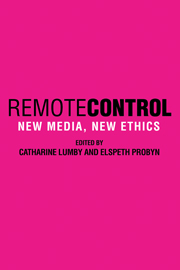Book contents
- Frontmatter
- Contents
- List of Contributors
- Acknowledgements
- 1 Introduction: An Ethics of Engagement
- 2 Real Appeal: The Ethics of Reality TV
- 3 Arguing about Ethics
- 4 ‘Their own media in their own language’
- Beyond the Disconnect: Practical Ethics
- 5 A Viable Ethics: Journalists and the ‘Ethnic Question’
- 6 Ethics, Entertainment and the Tabloid: The Case of Talkback Radio in Australia
- Money versus Ethics
- 7 Eating into Ethics: Passion, Food and Journalism
- Beyond Food Porn
- 8 Ethics impossible? Advertising and the Infomercial
- Pitching to the ‘Tribes’: New Ad Techniques
- 9 Diary of a Webdiarist: Ethics Goes Online
- 10 Control-SHIFT: Censorship and the Internet
- Representing the Asylum Seekers
- 11 The Ethics of Porn on the Net
- Ethics and Sex
- 12 Grassroots Ethics: The Case of Souths versus News Corporation
- 13 Great Pretenders: Ethics and the Rise of Pranksterism
- The Limits of Satire
- Index
5 - A Viable Ethics: Journalists and the ‘Ethnic Question’
Published online by Cambridge University Press: 18 December 2009
- Frontmatter
- Contents
- List of Contributors
- Acknowledgements
- 1 Introduction: An Ethics of Engagement
- 2 Real Appeal: The Ethics of Reality TV
- 3 Arguing about Ethics
- 4 ‘Their own media in their own language’
- Beyond the Disconnect: Practical Ethics
- 5 A Viable Ethics: Journalists and the ‘Ethnic Question’
- 6 Ethics, Entertainment and the Tabloid: The Case of Talkback Radio in Australia
- Money versus Ethics
- 7 Eating into Ethics: Passion, Food and Journalism
- Beyond Food Porn
- 8 Ethics impossible? Advertising and the Infomercial
- Pitching to the ‘Tribes’: New Ad Techniques
- 9 Diary of a Webdiarist: Ethics Goes Online
- 10 Control-SHIFT: Censorship and the Internet
- Representing the Asylum Seekers
- 11 The Ethics of Porn on the Net
- Ethics and Sex
- 12 Grassroots Ethics: The Case of Souths versus News Corporation
- 13 Great Pretenders: Ethics and the Rise of Pranksterism
- The Limits of Satire
- Index
Summary
INTRODUCTION
BECAUSE SOCIAL ETHICS IS ALWAYS CONCERNED WITH THE WAY individuals relate to and interact with each other, the question of ‘the other’, the one we are interacting with, is always at the heart of all social ethical concerns. Indeed, if there is one question that encapsulates the essential concerns of all social ethical investigations, it is this one: when we human beings interact with each other, how should we regulate our conduct so as to sustain each other's viability as human beings? This means a recognition that other people are, like us, engaged in a struggle to make their lives as human beings worth living. To try and sustain the human viability of others is to help them in this struggle.
In this essay, I will reflect on the significance of this question for White journalists writing and talking about Third-World-looking Australians, or as they are more popularly referred to, ‘ethnic’ Australians. I want to know, how could White journalists report or comment on ‘ethnic’ people in a way that sustains their human viability? I hope it will become clear that such ethical questions are not about ‘being nice to people’. They are about treating people as human beings. ‘Being nice’ to some people does not mean you are treating them as human beings. You can be very nice to animals without necessarily humanising them and, likewise, you can be very nice to humans and animalise them.
- Type
- Chapter
- Information
- Remote ControlNew Media, New Ethics, pp. 74 - 86Publisher: Cambridge University PressPrint publication year: 2003
- 1
- Cited by



